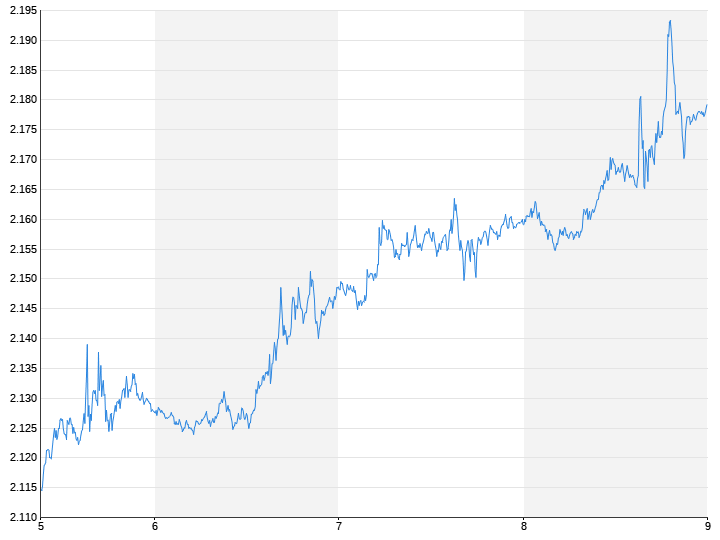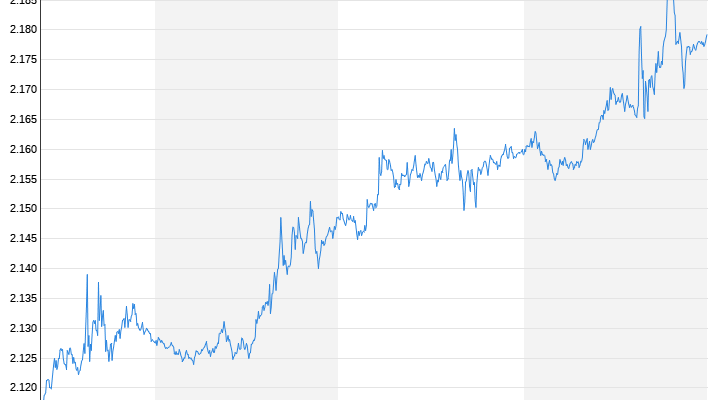The price of gold has been rising steeply since February. Market strategist John Reade reveals how investors can make their portfolio crisis-proof. What you have to pay attention to and what parallels there are to Bitcoin.
Wars, conflicts and economic downturns scare many people. Is gold celebrating a comeback as a crisis protection in such an environment?
John Reade: Gold has many properties. One thing that makes it a useful component in a portfolio is that the price moves independently of what’s happening in the stock and bond markets. If there is a crisis, share prices often collapse rapidly. The gold price then usually develops well. Gold is definitely a crash and crisis protection in the portfolio.
How does the price typically develop?
In such cases, the price of gold rises in the short term and remains strong for up to three months. However, speculating on the price of gold is difficult because sudden price increases are usually accompanied by an unforeseen crisis. But it makes sense to hold gold for the long term – as a calming element in your portfolio.
This year, a large proportion of people are voting for a new government, including in the USA. How does the price of gold behave around such an election?
As a rule, gold buyers in the USA are mostly older, male and conservative. They buy gold when they are afraid. But they are less afraid when their husband is in power. That should weaken gold. If Trump continues as president, there is a possibility that the US could become further isolated because he currently does not appear to support organizations such as NATO and the UN. And he will use sanctions against countries more quickly. These factors are expected to boost demand for gold. Central banks in developing countries will then want to exchange at least some of their US dollar holdings for alternatives.
And gold is then the alternative of choice?
We have already seen increased purchases of gold by central banks last year. The institutions are thus preparing for a multipolar world in which the dollar no longer plays such a dominant role as the reserve currency. But because no other currency is yet strong enough to compete with the dollar, central banks are temporarily parking their capital in gold.
Which currencies could play a central role in the future?
The Chinese renminbi, the Indian currency rupee, perhaps the Indonesian rupiah and the real from Brazil want to compete. However, these currencies cannot yet be purchased. It is clear that this will take years as countries continue to grow and have to reform their financial markets.
Could central banks back their currencies with gold, as was common during the gold standard era? Some people believe that.

I do not believe that. It could be that countries with the ambition to make their currencies the reserve currency are buying gold because central banks in developed markets think highly of it. They want to go along.
Does the rule of thumb “if the dollar weakens, the price of gold rises” still apply?
This hasn’t been the case in recent years: gold has performed well even though the dollar has been strong because of all the crises. Interest rates will probably be cut first in the USA this year. It may be that the recent gold rally has something to do with this: as interest rate cuts weaken the dollar, investors are rebalancing. Then it’s true again. The price of gold usually rises more than the currency falls because investors want to protect themselves against a further decline in the dollar.
Back to crisis protection: Many cryptocurrency fans believe that Bitcoin is digital gold. Can it also serve as crisis protection?
There are parallels between Bitcoin and gold: the supply is limited and grows more slowly every year. It’s the same with gold. And it makes it possible to invest money outside the financial system. But the differences are crucial. There may be one or two investors who speculate on the price of gold from time to time. However, Bitcoin is only held by investors who bet on price increases. Gold diversifies a portfolio and reduces risks – at least when the addition is between five and ten percent of the portfolio’s total. With Bitcoin, investors increase volatility as if they were investing in the riskiest tech stocks on the Nasdaq.
But cryptocurrency prices rise during local crises.
There is no doubt that cryptocurrencies have a role to play in circumventing exchange controls and moving money out of the country.
More speculative Financial products such as gold ETFs do not have a large volume compared to cryptocurrencies. Why is that?
Exchange-traded gold products play only a small role in the overall gold market. In Europe in particular, the market for gold-backed ETFs is underdeveloped and they are simply not permitted. We do not count ETPs that invest in derivatives and can be invested here when we write our annual gold report. We only consider funds where the issuer holds the gold itself.
Who invests in these ETFs?
They are usually institutional investors. ETFs are the fastest and easiest way to invest in gold. It can be traded like a stock and many people only invest for a short time because they are speculating on price increases. Others who want to invest a large sum in gold often park it in an ETF for the time being, for example until they have opened a safe deposit box or a so-called “metal account” at a bank or set up the infrastructure to store the gold themselves. So outflows do not mean that the investor has exited. It may be that he simply changed the form of investment.
Over-the-counter trading increased massively last year. Which players are active on the shadow market?
In principle, the number of how much is traded outside of the stock exchanges is an estimate: we look at the gold supply and subtract the official demand, for example for bars and coins, but also from industry and jewelry manufacturers. However, there are no hard facts. But there is evidence that rich people and corporations in Asia have been buying gold over the counter. A lot of new family offices are currently opening in Hong Kong and Singapore. Many of their customers come from China. They are investing in gold for the same reasons that central banks have recently been buying, especially in emerging countries. Over-the-counter demand was also high in Turkey because the lira had depreciated so massively and inflation was high. In principle, there is a healthy demand for gold hidden in over-the-counter trading.
Are there disadvantages to buying gold over the counter – why don’t companies buy on exchanges?
Yes, there are disadvantages if you want to sell the gold again. Anyone who buys on the stock exchange or has the gold in a bank deposit is selling on a transparent market. The cash is simply credited to the account. Otherwise, you may find yourself in need of an explanation to the bank. In addition, the costs for storage and buying and selling are higher. This only makes sense if you want to hold gold for a long time, like central banks. Investment companies typically hold three quarters physically and one quarter as an ETF.
Are regulators or countries like China with capital controls not interested in bringing over-the-counter trading onto visible platforms?
There is hardly any over-the-counter trading in China. In western markets such as the USA, Great Britain and Switzerland, privacy is very important. And I think we should respect that. There are reasons why people want to keep their gold holdings private. Transparency is therefore not good – except for the regulators.
Birgit Haas spoke to John Reade
The article first appeared at Capital.de.
